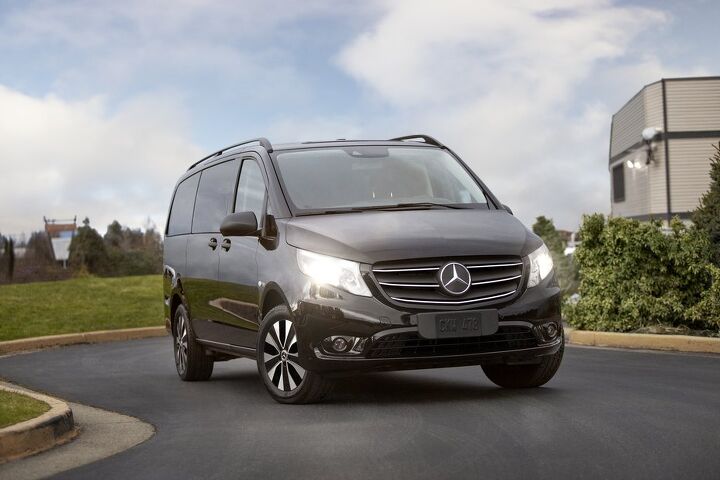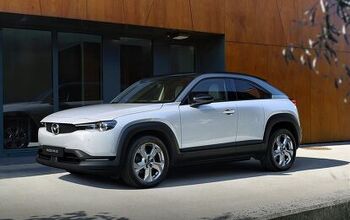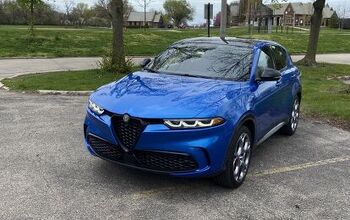Mercedes Pulling Metris Van From U.S. Market

Reports that Mercedes would be removing its Metris van from the U.S. market emerged over the weekend, with the German automaker confirming the decision.
Despite carrying a larger price tag than the competition (starting around $35,000), the Metris often compares favorably from behind the wheel when the maximum cargo capacity and price aren't the chief concerns. Unfortunately, those tend to be very important items when people are shopping for working vehicles and the Metris' sales numbers have reflected that. Mercedes has struggled to reach 10,000 deliveries annually and the Metris volume is routinely bested by models like the smaller Ford Transit Connect or the ancient, full-size Chevrolet Express.
Those aren't even the most popular alternatives, just a couple of random examples highlighting that the model's European sizing might not have played well in the United States. The Metris tends to be a little larger than the city vans preferred by small businesses and independent tradesmen — but dwarfed by full-sized vans focused entirely on capacity. The German commercial van's interior also lacks the same level of luxury expected from other products wearing the Mercedes badge. While it's a cut above some other working vehicles designed to ferry passengers, it's universally outclassed by the features found on the minivans occupying today the market (e.g. Chrysler Pacifica, Honda Odyssey, Toyota Sienna) which are also probably the closest to the Metris in overall size.
But it may be unfair to say Mercedes is pulling out wholly due to a lack of interest when Metris sales were improving ahead of the pandemic and on pace to break a record this year. In fact, the manufacturer would probably rather we ignore the glaring volume issue and focus on its decision to eliminate the turbocharged 2.0-liter inline-four that goes into the model. On Friday, Automotive News reported that it had intercepted a dealer memo stating that the motor would be discontinued, which likewise spells doom for certain versions of the larger Mercedes Sprinter van.
"As a result, the Mercedes-Benz Metris and gasoline Sprinter models will no longer be offered in the U.S. market after Q3 2023," the brand's U.S. vice president of commercial vehicles, Nicolette Lambrechts, said in the letter.
The Sprinter van's vastly more popular diesel option should stick around while the company prepares to electrify as many vehicles as is feasible. But something tells me the Metris would have been yanked from our market even if that wasn't the case. Considering the manufacturer has only sold around 60,000 units in America since 2015, there was likely no way MB Vans would have tried to press on. Mercedes is also starting to shift back upmarket, abandoning some of its lower-margin products that sticker for less.
[Images: Mercedes-Benz]
Become a TTAC insider. Get the latest news, features, TTAC takes, and everything else that gets to the truth about cars first by subscribing to our newsletter.

A staunch consumer advocate tracking industry trends and regulation. Before joining TTAC, Matt spent a decade working for marketing and research firms based in NYC. Clients included several of the world’s largest automakers, global tire brands, and aftermarket part suppliers. Dissatisfied with the corporate world and resentful of having to wear suits everyday, he pivoted to writing about cars. Since then, that man has become an ardent supporter of the right-to-repair movement, been interviewed on the auto industry by national radio broadcasts, driven more rental cars than anyone ever should, participated in amateur rallying events, and received the requisite minimum training as sanctioned by the SCCA. Handy with a wrench, Matt grew up surrounded by Detroit auto workers and managed to get a pizza delivery job before he was legally eligible. He later found himself driving box trucks through Manhattan, guaranteeing future sympathy for actual truckers. He continues to conduct research pertaining to the automotive sector as an independent contractor and has since moved back to his native Michigan, closer to where the cars are born. A contrarian, Matt claims to prefer understeer — stating that front and all-wheel drive vehicles cater best to his driving style.
More by Matt Posky
Latest Car Reviews
Read moreLatest Product Reviews
Read moreRecent Comments
- Mason Had this identical car as a 17 year old in the late 90's. What a ball of fun, one of many I wish I still had.
- FinnEss At my age, sedans are difficult to get into without much neck and hip adjustment.I apologize sincerely but that is just the way it is. A truck is my ride of choice.Pronto
- Ajla The market for sedans is weaker than it once was but I think some of you are way overstating the situation and I disagree that the sales numbers show sedans are some niche thing that full line manufacturers should ignore. There are still a sizeable amount of sales. This isn't sports car volume. So far this year the Camry and Civic are selling in the top 10, with the Corolla in 11 and the Accord, Sentra, and Model 3 in the top 20. And sedan volume is off it's nadir from a few years ago with many showing decent growth over the last two years, growth that is outpacing utilities. Cancelling all sedans now seems more of an error than back when Ford did it.
- Duties The U.S . would have enough energy to satisfy our needs and export energy if JoeBama hadn’t singlehandedly shut down U.S. energy exploration and production. Furthermore, at current rates of consumption, the U.S. has over two centuries of crude oil, https://justthenews.com/politics-policy/energy/exclusive-current-rates-consumption-us-has-more-two-centuries-oil-report.Imagine we lived in a world where all cars were EV's. And then along comes a new invention: the Internal Combustion Engine.Think how well they would sell. A vehicle HALF the weight, HALF the price that would cause only a quarter of the damage to the road. A vehicle that could be refueled in 1/10th the time, with a range of 4 times the distance in all weather conditions. One that does not rely on the environmentally damaging use of non-renewable rare earth elements to power it, and uses far less steel and other materials. A vehicle that could carry and tow far heavier loads. And is less likely to explode in your garage in the middle of the night and burn down your house with you in it. And ran on an energy source that is readily extracted with hundreds of years known supply.Just think how excited people would be for such technology. It would sell like hot cakes, with no tax credits! Whaddaya think? I'd buy one.
- 3SpeedAutomatic I just road in a rental Malibu this past week. Interior was a bit plasticity, but, well built.Only issue was how “low” the seat was in relation to the ground. I had to crawl “down” into the seat. Also, windscreen was at 65 degree angle which invited multiple reflections. Just to hack off the EPA, how about a boxy design like Hyundai is doing with some of its SUVs. 🚙 Raise the seat one or two inches and raise the roof line accordingly. Would be a hit with the Uber and Lyft crowd as well as some taxi service.🚗 🚗🚗





































Comments
Join the conversation
I am sure somewhere, somebody is saddened by this.
I'm guessing this thing's gonna come back to the U.S. wearing a Freightliner badge.